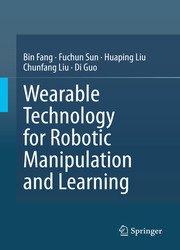Wearable Technology for Robotic Manipulation and Learning
- Добавил: literator
- Дата: 6-10-2020, 19:13
- Комментариев: 0
 Название: Wearable Technology for Robotic Manipulation and Learning
Название: Wearable Technology for Robotic Manipulation and Learning Автор: Bin Fang, Fuchun Sun, Huaping Liu
Издательство: Springer
Год: 2020
Страниц: 219
Язык: английский
Формат: pdf (true)
Размер: 10.1 MB
Provides a systematic and comprehensive introduction to robotic imitation learning. Introduces demonstration-learning-based solutions for robotic manipulation. Showcase the applications of wearable devices in robotic learning.
Over the next few decades, millions of people, with varying backgrounds and levels of technical expertise, will have to effectively interact with robotic technologies on a daily basis. This means it will have to be possible to modify robot behavior without explicitly writing code, but instead via a small number of wearable devices or visual demonstrations. At the same time, robots will need to infer and predict humans’ intentions and internal objectives on the basis of past interactions in order to provide assistance before it is explicitly requested; this is the basis of imitation learning for robotics.
This book introduces readers to robotic imitation learning based on human demonstration with wearable devices. It presents an advanced calibration method for wearable sensors and fusion approaches under the Kalman filter framework, as well as a novel wearable device for capturing gestures and other motions. Furthermore it describes the wearable-device-based and vision-based imitation learning method for robotic manipulation, making it a valuable reference guide for graduate students with a basic knowledge of machine learning, and for researchers interested in wearable computing and robotic learning.
This book is divided into three parts: The first part presents the research background and motivation and introduces the development of wearable technologies and applications of wearable devices. The second part focuses on wearable technologies. In Chap. 2, wearable sensors including inertial sensors and tactile sensors are presented. In Chap. 3, multisensor fusion methods are developed to tackle the accurate motion capture by wearable devices. Chapter 4 demonstrates their applications including gesture recognition, tactile interaction, and tactile perception. The third part presents the methods of robotic manipulation learning. Chapter 5 tackles the problem of manipulation learning from the teleoperation demonstration of a wearable device using dynamical movement primitive. Chapters 6 addresses the problem of manipulation learning from visual-based teleoperation demonstration by developing deep neural networks methodology. Chapter 7 focuses on learning from a wearable-based indirect demonstration. The fourth part contains Chap. 8, which summarizes this book and presents some prospects.
Скачать Wearable Technology for Robotic Manipulation and Learning
[related-news] [/related-news]
Внимание
Уважаемый посетитель, Вы зашли на сайт как незарегистрированный пользователь.
Мы рекомендуем Вам зарегистрироваться либо войти на сайт под своим именем.
Уважаемый посетитель, Вы зашли на сайт как незарегистрированный пользователь.
Мы рекомендуем Вам зарегистрироваться либо войти на сайт под своим именем.
